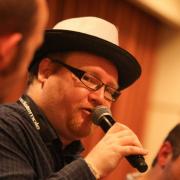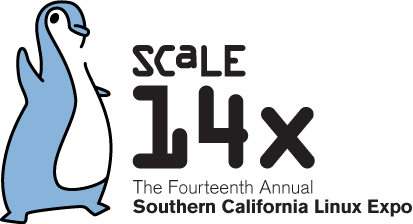Presentations
This must-see live event brings the team together to tape a live show in front of a live audience. The usual irreverent Bad Voltage style was be in full form with discussion and debate about Linux and Open Source, complete with plenty of surprises, competitions, contests, and give-aways.
Although this is at the SCALE14x conference, the show is open to everyone (but you should go to SCALE!). There will be beer.
Please note: this show will include some colorful language.

The web is ubiquitous and many “native apps” rely on web-based back-ends. From desktop to mobile, to watches, virtual reality headsets, and cars - the web is a core set of technologies with vast reach. This makes familiarity with web tech a valuable asset.
Whether you’re a software engineer, marketer, manager, junior web dev, or student - you'll leave this session with the forest, the trees, and a compass for navigating all of it. We'll cover languages, servers, tools, gotchas, and more.
Congratulations, you've mastered configuration management. So now what? SaltStack is not just configuration management. Intelligent orchestration and automation will help to optimize your infrastructure allowing the dynamic adjustment of infrastructure resources based on monitored changes and events. Dave will provide an overview and demonstration of SaltStack Beacons to monitor systems and the SaltStack event stream.

Drupal makes creating websites and applications pretty easy, but there are some difficult areas. Many print designers are used to starting with a blank page and placing the content where they want on the page. You can have great results, when the finished product is printed, you control the process from design to print and have the results you want. This is a difficult thing to do in an organized structured manner on a website. Things like making a design responsive and display properly on all the different devices is very difficult.

The Ubuntu community offers a vast number of places to get involved and much of this volunteer work directly translates into skills that can be then used in a technical career. This talk will cover these opportunities and how they translate into real world experience for many of us who are now paid to work on free and open source software.

A not-code-heavy discussion of how to build apps for Ubuntu, but more importantly to add features that we expect from other platforms: how to add analytics to your Ubuntu phone app, or adverts to monetise it, or payments; the features that other phone OSes provide that change your app from being just a fun project to something a company could consider making.
The Internet of Things (IoT) concerns data drawn from a great number of devices, including sensors, embedded systems and wearable devices.
LXC Linux Cocntainers have made it possible to deploy any Oracle Enterprise Software on Ubuntu Linux natively with NO hypervisor and at bare-metal resource utilizations with 10x the density of hypervisor solutions.

The confluence of a number of relatively recent trends including the development of virtualization technologies, the deployment of micro datacenters at PoPs, and the availability of microservers, opens up the possibility of evolving the cloud, the network it is connected to, towards a superfluid cloud: a model where parties other than infrastructure owners can quickly deploy and migrate virtualized services throughout the network (in the core, at aggregation points and at the edge), enabling a number of novel use cases including virtualized CPEs and on-the-fly services, among others.
Chef is an automation platform that transforms infrastructure into code. This is a hands-on tutorial that will cover the basics that everyone needs to know about how to use Chef for system and infrastructure management. We'll discuss the server API, the code primitives, and the tools required to successfully use Chef. Hands-on exercises throughout the tutorial will reinforce the material discussed.


